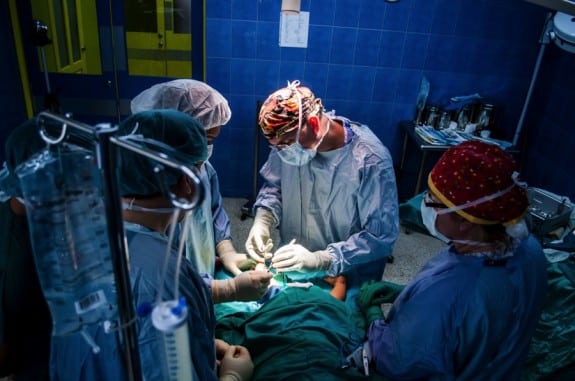There’s nothing more frightening than watching your baby be wheeled off into an operating room, but when it comes to surgery during infancy, procedures are generally done out of necessity. Parents are advised (as is anyone undergoing surgery) that anesthesia comes with risks. But researchers now believe there may be an additional risk – one that may have life-long implications – on a developing child.
Former studies from the Cincinnati Children’s Hospital Medical Center research team have found widespread cell death, permanent deletion of neurons and neurocognitive impairment in lab rats and mice after being exposed to general anesthesia. Their new study, published in the journal Pediatrics, only gives more reason to be concerned about the long-term abnormalities and neuronal refinement issues that may result in children exposed to anesthesia at an early age.
While comparing the scores of 53 healthy participants of a language development study (ages 5 to 18) with the scores of 53 children in the same age range that had received surgery prior to age 4, researchers found that children exposed to anesthesia scored significantly lower in listening comprehension and performance IQ. Decreased language and IQ scores were also associated with lower gray matter density in the occipital cortex and cerebellum of the brain. Researchers did stress, however, that the average test scores for all 106 children were still within population norms, regardless of their surgical history. But this difference still equated what the authors estimated to be a $540 billion dollar lifetime earning loss in the some 6 million children who undergo surgery annually in the United States.
It is because of these possibly monumental repercussions that researchers recommended there be additional studies into the precise molecular effects of anesthesia on the brain of young children. They hope to use this additional information to develop mitigating strategies for what the authors describe as a “potential dilemma for child health.”
“The ultimate goal of our laboratory and clinical research is to improve the safety and outcomes in young children who have no choice but to undergo surgery with anesthesia to treat their serious health concerns,” Andreas Loepke, MD, PhD, FAAP, lead study author, and an anesthesiologist in the Department of Anesthesiology at Cincinnati Children’s, told Science Daily. “We also have to better understand to what extent anesthetics and other factors contribute to learning abnormalities in children before making drastic changes to our current practice, which by all measures, has become very safe.”
For parents that have a child who needs surgery, researchers encourage an open discussion with the physician about the risks – risks of waiting, and risks of following through with the surgery.
“It is important to note that no surgeries are truly elective in young children,” Loepke said. “Many surgical procedures early in life treat life-threatening conditions, avert serious health complications, or improve quality of life. These cannot be easily postponed or avoided.”
Related Articles:
- Researchers: No Proven Health Benefits From Consuming Placenta
- People with Autism are Sensitive to the World around Them, Not Impaired
- Solid Foods Being Fed to Infants Too Early, CDC Says







